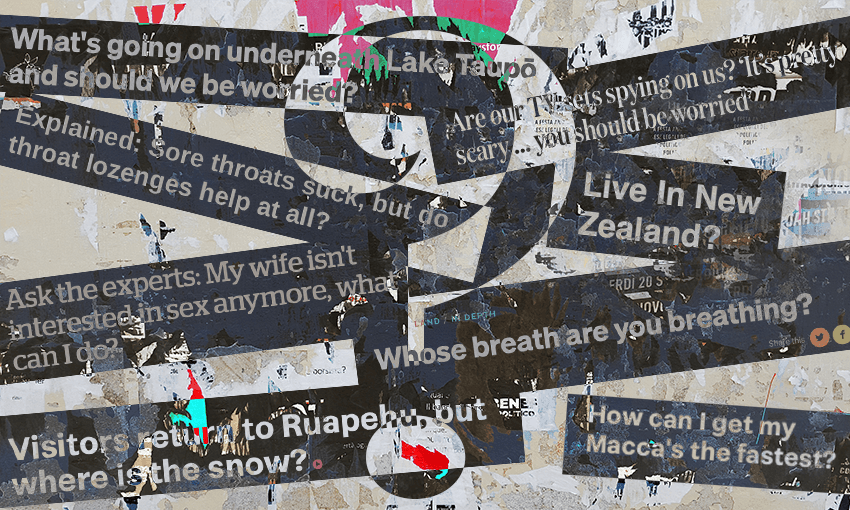Headlines that tempt readers to click with random questions have gone from a special occasion event to an everyday occurrence. Why?
Where is New Zealand’s best city for you? (New Plymouth.) Are you ready for Barbiecore decor? (No.) Why do my shoes squeak and what can be done about it? (Buy a new pair.) What’s going on underneath Lake Taupō and should we be worried? (Hmm.) Live in New Zealand? (Yes.) At the top of your game? (Umm … no?)
Did you click on one of these headlines? Don’t be ashamed – you’re not alone. Every day, Aotearoa’s major news sites churn out pages of content that dangle a tantalising opportunity in front of readers. If you want to know the answer to the topic at hand, these headlines say, you’re going to need to give us a click.
“It’s the ultimate in clickbait” says The Spinoff’s live updates editor Stewart Sowman-Lund. He admits to occasionally putting questions in headlines himself. He also clicks on those posted by other sites too. Recently, the fast-food fan read the story, “How do you get your Macca’s the fastest?”, a Stuff investigation into which app was quickest to deliver a Big Mac to the company’s Ponsonby office.
What was the answer? Sowman-Lund can’t remember. (For the record, dining in is the quickest way to get your Filet-O-Fish and fries, not Uber Eats). But it doesn’t matter. Stuff got their click, and in the world of online news, as Facebook and Instagram switch up their algorithms to focus less on news and more on short-form videos to rival TikTok, the click is the most important thing.
It didn’t used to be this way. Twenty years ago, before internet news came along and ruined a good thing, newspaper front pages used questions on only the rarest of occasions. That means they’re entirely a creation of the internet, a trend driven by lifestyle and travel sections that’s grown entirely out of control. It’s less about telling readers news, and more about daring readers not to click on a topic they may not have thought about until they were challenged on it. It’s a daily dose of pub quiz mentality mixed with the constant churn of clickbait roulette.
When you start looking, these kinds of headlines are everywhere. There’s an avalanche, a tidal wave, an onslaught of questionable headlines. Across the past three weeks, I’ve been informally analysing New Zealand’s biggest news sites – yes, that includes The Spinoff, where I admit I pose the occasional question too – to see just how much they’re being used. The answer? Often.
Top marks to the Otago Daily Times and TVNZ, who save them for a rare treat. At Newshub and RNZ, they’re used sparingly, often to great effect. The Spinoff posed five questions on its homepage on one survey day, all of them entirely clickable and including the wonderful alliteration: “What’s behind Aotearoa’s seafood boil boom?” (I clicked.)
But, if there was a Voyager Media Award for posing headline questions, just two would be at the top duking it out to the death. That’s NZ Herald and Stuff, the mighty local news behemoths who pose questions to their readers so regularly they seem to be attempting some kind of brutal back-and-forth slam poetry competition. Twenty-two question marks could be found on Stuff’s homepage on one visit, and a whopping 52 on NZ Herald (some of which were repeated headlines in sections further down the page).
Are there trends? Thank you for asking. The answer’s yes. Mostly, these kinds of headlines fall into three distinct groups. Firstly, there are headlines that pose super-niche questions, possibly in an attempt to answer a question no one’s ever asked on a news site before, then sit on top of Google’s search engine results in perpetuity for anyone taking to Google to fix their squeaky shoes.
The second category is reserved for headlines that use questions in an inappropriate way. These kinds of headlines make serious topics sound far more flippant than they probably should be, forcing readers to click with a weird combination of errant chirpiness and impending doom.
The third category is saved for headlines that ask questions then answer them themselves, thus negating the need for a click. This happens a surprising amount. (I refused to click on one of these. Can you guess which one?)
There’s one more category, a personal favourite that I call the “WTF is this? Okay you got me, I’ll click” headlines. Full of abstract entries or those perhaps cut to fit into small spaces, they seem to have become lost in translation. They’re so good, and so strange, that if you put them on a T-shirt, I’d wear it.
Is there a winner? Good question. Yes! Over the past three weeks of scouring and screenshotting news sites around the country, one stood out from all the others. The crème de la crème, the icing on the cake, the question to end all questions, the Voyager-winning entry for a category that doesn’t exist, is this stellar effort from RNZ.
Are you ready? Maybe sit down for this one.
It’s timely, it’s relevant, it’s almost every category rolled into five exquisite words followed by a three-quarters circle and a dot. It’s a poem for the ages. Ladies and gentlemen, our back alley slam poetry competition has a winner. Chef’s kiss. (Didn’t click.)

